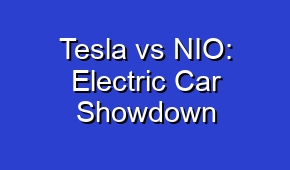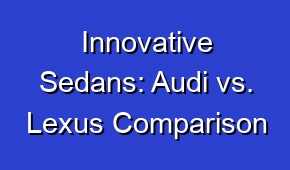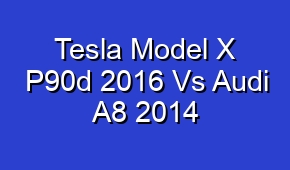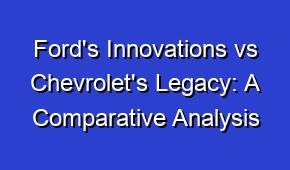Electric Cars: Tesla vs. the Competition
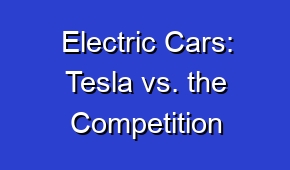
Get ready to dive into the ultimate showdown: electric cars. In one corner, we have Tesla, the trailblazer that revolutionized the industry. In the other corner, a world of competitors vying for the top spot. Discover the electrifying battle between Tesla and the rest of the world as they race towards a sustainable future.
When it comes to the world of electric cars, Tesla stands out as a dominant force. With its cutting-edge technology and sleek designs, Tesla has revolutionized the industry. However, it’s not the only player in the game. There are several other electric car manufacturers that are vying for a piece of the market. From established brands like BMW and Nissan to up-and-coming companies like Rivian and Lucid Motors, the competition is fierce. Each brand brings its own unique features and advantages to the table, making it an exciting time for consumers. Whether you’re looking for range, performance, or sustainability, there’s an electric car out there that suits your needs. So, while Tesla may be leading the charge, the battle for supremacy in the world of electric cars is far from over.
| Tesla is a leading electric car manufacturer known for its innovative technology. |
| Electric cars are gaining popularity worldwide as environmentally friendly alternatives to traditional vehicles. |
| Tesla’s electric cars offer impressive range and performance compared to other brands. |
| Charging infrastructure is a key factor in the adoption of electric vehicles. |
| The competition among electric car manufacturers is intensifying as more companies enter the market. |
- Tesla’s Model S has been praised for its luxurious design and long-range capabilities.
- Nissan Leaf is a popular electric car option known for its affordability and practicality.
- The Volkswagen ID.3 aims to make electric cars more accessible to the mass market.
- Rivian is an emerging electric vehicle manufacturer focusing on electric trucks and SUVs.
- BMW i3 offers a combination of sustainability, performance, and cutting-edge technology.
What are the advantages of electric cars?
Electric cars offer several advantages over traditional gasoline-powered vehicles. Firstly, they are more environmentally friendly as they produce zero emissions, helping to reduce air pollution and combat climate change. Additionally, electric cars are generally more energy-efficient, meaning they require less energy to travel the same distance compared to internal combustion engine vehicles. This can result in lower fuel costs for drivers. Furthermore, electric cars often have lower maintenance costs as they have fewer moving parts and do not require oil changes.
| Reduced Emissions | Lower Fuel Costs | Less Noise Pollution |
| Electric cars produce zero tailpipe emissions, helping to reduce air pollution and combat climate change. | Electricity is generally cheaper than gasoline, resulting in lower fuel costs for electric car owners. | Electric cars operate quietly, reducing noise pollution in urban areas and making for a quieter driving experience. |
| Renewable Energy Integration | Lower Maintenance Costs | Improved Energy Efficiency |
| Electric cars can be charged using renewable energy sources such as solar or wind power, contributing to a more sustainable energy system. | Electric cars have fewer moving parts and do not require oil changes, resulting in lower maintenance costs compared to internal combustion engine vehicles. | Electric cars are more energy-efficient than gasoline cars, as they convert a higher percentage of the stored energy into actual driving power. |
Why is Tesla considered a leader in the electric car industry?
Tesla is widely regarded as a leader in the electric car industry due to several factors. Firstly, Tesla has been at the forefront of developing and improving electric vehicle technology, consistently pushing the boundaries of innovation. Their vehicles are known for their long range capabilities and fast acceleration. Additionally, Tesla has developed a robust network of Supercharger stations, making long-distance travel more convenient for Tesla owners. Furthermore, Tesla’s Autopilot feature, although not fully autonomous, offers advanced driver-assistance capabilities that set them apart from other manufacturers.
- Tesla’s innovation in electric car technology: Tesla has been at the forefront of electric car technology, consistently pushing the boundaries of what is possible. They were one of the first companies to introduce long-range electric vehicles, with their Model S offering over 300 miles of range on a single charge. Additionally, Tesla’s vehicles have been praised for their impressive acceleration and handling, further establishing their position as a leader in the industry.
- Supercharger network: One of the biggest challenges for electric car owners is finding convenient and accessible charging stations. Tesla has addressed this issue by creating their own Supercharger network. These charging stations are strategically located along major highways and allow Tesla owners to quickly charge their vehicles, significantly reducing charging time compared to other charging options. This extensive network gives Tesla owners more freedom and confidence in driving longer distances, solidifying Tesla’s position as a leader in the electric car industry.
- Autopilot technology: Tesla has been a pioneer in developing advanced driver-assistance systems, particularly with their Autopilot feature. This system utilizes various sensors and cameras to enable semi-autonomous driving capabilities. While not fully autonomous, Tesla’s Autopilot technology has been widely recognized for its effectiveness in enhancing safety and convenience for drivers. This innovation has set Tesla apart from other electric car manufacturers and has contributed to their leadership position in the industry.
How does the range of electric cars compare to traditional gasoline cars?
The range of electric cars has improved significantly in recent years, but it still varies depending on the model and manufacturer. While some electric cars can achieve ranges comparable to traditional gasoline cars, others may have a more limited range. Factors such as driving conditions, speed, and weather can also affect the range of an electric car. However, advancements in battery technology continue to extend the range of electric vehicles, making them a viable option for many drivers.
- Electric cars typically have a lower range compared to traditional gasoline cars.
- The range of electric cars can vary depending on factors such as battery capacity, driving conditions, and driving style.
- On average, electric cars have a range of around 100 to 300 miles on a single charge.
- Traditional gasoline cars, on the other hand, can have a range of 300 to 500 miles or more on a full tank of fuel.
- However, advancements in electric vehicle technology are constantly improving the range, and some electric cars now offer ranges comparable to gasoline cars.
What is the charging infrastructure like for electric cars?
The charging infrastructure for electric cars has been expanding rapidly in recent years. In addition to home charging options, there are various public charging stations available, including fast-charging stations that can provide a significant amount of charge in a short period. Companies like Tesla have also developed their own network of Supercharger stations, which are strategically located along popular travel routes. Furthermore, governments and private companies are investing in the development of more charging infrastructure to support the growing number of electric vehicles on the road.
| Charging Type | Charging Speed | Availability |
| Level 1 (AC Charging) | Slow (2-5 miles of range per hour) | Available at most homes and some public places |
| Level 2 (AC Charging) | Medium (10-20 miles of range per hour) | Available at homes, workplaces, and many public charging stations |
| DC Fast Charging (Level 3) | Fast (80% charge in 20-30 minutes) | Available at select public charging stations along highways and in urban areas |
Are electric cars more expensive than gasoline cars?
Generally, electric cars tend to have a higher upfront cost compared to traditional gasoline cars. This is primarily due to the cost of the battery technology used in electric vehicles. However, it’s important to consider the total cost of ownership over the lifespan of the vehicle. Electric cars typically have lower operating and maintenance costs, as electricity is generally cheaper than gasoline and electric vehicles require less maintenance. Additionally, there may be government incentives and tax credits available that can help offset the initial cost of purchasing an electric car.
Electric cars can be more expensive than gasoline cars initially, but they have lower operating and maintenance costs in the long run.
What is the current state of electric car adoption worldwide?
The adoption of electric cars varies across different countries and regions. Some countries have implemented policies and incentives to promote electric vehicle adoption, resulting in higher market shares for electric cars. For example, Norway has one of the highest electric car adoption rates globally, with electric vehicles accounting for a significant portion of new car sales. Other countries, such as China and Germany, have also seen significant growth in electric car sales. However, in many regions, electric cars still represent a relatively small percentage of overall vehicle sales.
The current state of electric car adoption worldwide is rapidly growing, with increasing sales, government incentives, and expanding charging infrastructure.
How does Tesla compare to other electric car manufacturers?
Tesla has established itself as a prominent player in the electric car market, but there are also other manufacturers producing electric vehicles. Companies like Nissan, Chevrolet, BMW, and Audi have introduced their own electric car models. While Tesla is known for its high-performance vehicles and advanced technology, other manufacturers offer a range of electric cars that cater to different needs and budgets. Factors such as price, range, charging infrastructure, and brand reputation can influence the comparison between Tesla and other electric car manufacturers.
Range and Battery Efficiency
Tesla vehicles are known for their impressive range and battery efficiency. They often outperform other electric car manufacturers in terms of the distance they can travel on a single charge. This is partly due to Tesla’s use of advanced battery technology and their extensive Supercharger network, which allows for faster charging times. Additionally, Tesla’s vehicles tend to have higher energy efficiency ratings compared to their competitors, meaning they can travel further on the same amount of energy.
Performance and Acceleration
When it comes to performance and acceleration, Tesla cars have set a new standard in the electric vehicle market. They are known for their quick acceleration and sporty driving experience. Tesla’s electric motors deliver instant torque, providing impressive acceleration from a standstill. Some Tesla models, such as the Model S Plaid, have even achieved record-breaking acceleration times, surpassing many high-performance gasoline-powered cars.
Autonomous Driving and Software Updates
Tesla has been a pioneer in autonomous driving technology. Their vehicles come equipped with advanced driver-assistance systems, and Tesla owners have access to features such as Autopilot, which can assist with tasks like lane-keeping and adaptive cruise control. Furthermore, Tesla’s over-the-air software updates allow for continuous improvements and the addition of new features to their vehicles. This sets Tesla apart from other electric car manufacturers, as they have been able to enhance the driving experience through software updates, providing a level of innovation and convenience that is unmatched by their competitors.


